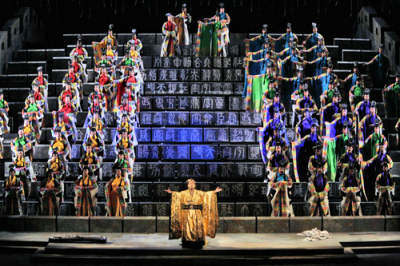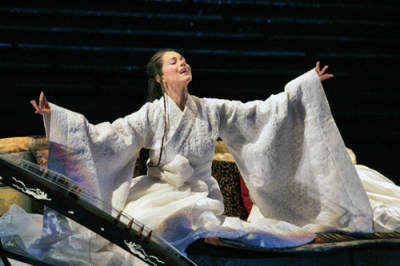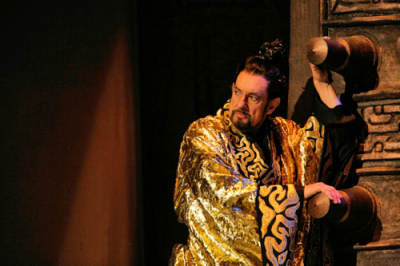Tan
Dun:
The First Emperor (2006, world
premiere): Soloists, Orchestra of Metropolitan Opera,
Tan Dun (cond), Metropolitan Opera, New York City, 26.12.2006
and 13.01.2007 (BH)

Libretto by
Ha Jin and Tan Dun
Conductor:
Tan Dun
Production:
Zhang Yimou
Set Designer:
Fan Yue
Costume
Designer:
Emi Wada
Lighting
Designer:
Duane Schuler
Co-Director:
Wang Chaoge
Choreographer:
Dou Dou Huang
Yin-Yang
Master, official geomancer:
Wu Hsing-Kuo
Shaman:
Michelle DeYoung
Emperor Qin:
Plácido Domingo
Chief
Minister:
Haijing Fu
General Wang:
Hao Jiang Tian
Princess
Yueyang, daughter of the emperor:
Elizabeth Futral
Mother of
Yueyang:
Susanne Mentzer
Gao Jianli, a
musician:
Paul Groves
Guard:
Danrell Williams
Principal
dancer:
Dou Dou Huang
Zheng player:
Qi Yao
Including
a press preview of Act I, I have now seen Tan Dun’s The
First Emperor two-and-a-half times, including the
live, high-definition video broadcast last week at a local
movie theater in Manhattan.
I wish I could say that its virtues (and there are more
than a few) grew with each viewing, but mostly the repeated
exposure mostly served to heighten the disappointments.
Nevertheless, creating new works is a risky enterprise,
and the Met should be encouraged to do more of them.
All of this said, the first fifteen minutes are stunning,
as intriguing as anything the Met has ever done.
As the Yin-Yang Master, who introduces and occasionally
comments on the story, Wu Hsing-Kuo leaps and whirls across
the stage in a gorgeous costume designed by Emi Wada,
perhaps best known for her Academy Award-winning work
in Akira Kurosawa’s film, Ran. Wu emerges
from the wings with his face painted red, but when he
whirls around he reveals a serene, Buddha-like mask on
the other side. His fusion of traditional narration
and movement is riveting and his presence is one of the
production’s great strengths.
The curtain then rises to reveal the immense set by Fan
Yue, row upon row of stone blocks hung from cables, able
to be raised and lowered individually or in groups.
Behind each one stands a member of the chorus. Right
down in front stretches a row of a dozen Chinese percussionists,
each behind a large drum played with a pair of black stones,
which can also be knocked together, creating rhythmic
patterns more complex than with the drums alone.
At stage left are sets of black ceramic tuned bowls, and
the zheng, a traditional instrument somewhat resembling
a zither but with a sound somewhere between a harp and
a steel guitar, played with passion by Qi Yao, who made
its distinctive sound mesh beautifully with the Met’s
musicians. Most people I polled could not recall
anything so unusual on the Met’s stage, ever.
Tan Dun’s language seems of two camps: on one hand, a
vivid, texturally diverse palette using heavy percussion
amperage, and on the other, a heartfelt, borderline saccharine
use of what sound like populist anthems. Whether
these can be successful playmates is not really resolved
here, and I can imagine audience members being fond of
one style or the other, but not both. Certainly
at the second performance the audience seemed to warm
up to the Puccini-esque flowerings, but my thoughts drifted
to the novel idea of Tan writing an opera with an orchestra
entirely of percussion instruments. One of
the high points in the second half is the use of a bian
zhong, an enormous gong hulking at stage right and
almost as large as a small car, that is repeatedly struck
with a large pole, making an ominous, resonant tolling
that could be signaling the end of the universe.

Elizabeth Futral as Yueyang
The visionary director Zhang Yimou, praised for films
like Raise the Red Lantern, Hero and House
of Flying Daggers (the latter is one of the most beautiful
of its type I have seen), here seems to run out of ideas
very quickly, and in general, the action is formal, slow,
and without the multiple frissons of his films.
The concrete blocks, formidable as they appear on first
viewing, ultimately don’t seem to offer many creative
possibilities, and the later scenes were basically static
tableaux, albeit shimmering ones.
As a conductor, Mr. Tan presumably made the best case
for his work and got a large variety of sounds out of
the orchestra and the Met chorus. But the back-and-forth
of the more traditional music eventually began to sound
as populist as early Shostakovich, such as his Hymn
to the Forest. I suspect that this slightly
naïve sounding style may be inherent in the genre, one
that Tan Dun decided to mine for its historical resonance,
but to my ears nothing emerged as striking as those pairs
of black rocks.
The
singers were often quite good, although Mr. Tan’s tessiture
at times seemed to tax them beyond reason. Elizabeth
Futral had many lustrous moments as Princess Yueyang,
despite some treacherous, prolonged passages at the very
highest end of her range. Susanne Mentzer (who recently
wowed us in Ravel’s L’enfant et les sortileges
at the New York Philharmonic) sang warmly and was touching
as her mother. Michelle DeYoung, towering in a mesmerizing,
slightly campy costume, used every bit of her huge range,
underlining the arcs of her voice by unfurling two slinky
sets of long fingernails. Paul Groves may have been
the best of all, with many gorgeous scenes as the musician
Gao Jianli, who ultimately dies for his love and his art.
The bass Hao Jiang Tian, renowned for playing Timur in
Turandot, also impressed as General Wang, Haijing
Fu did a fine job as the chief minister, and in a small
but significant turn, Dou Dou Huang was a model of how
dance can energize an operatic stage.

Plácido
Domingo as Emperor Qin
And what more can be said about Plácido
Domingo, who at age 66 seems indestructible? But
his artistry goes far beyond mere longevity. In
the challenging role of Emperor Qin, he was able to pull
together strands of feeling that made his entrances real
events, and plus, he just sounded fantastic. The
burnished tone of his voice continues to impress, as does
his acting, although he like the others was somewhat tethered
in his stage action. The precipitous steps of the
set may have contributed somewhat to this; I can’t imagine
anyone navigating them with anything other than trepidation,
to avoid tumbling down into the orchestra pit.
As a fan of both the composer and the esteemed director,
I had very high hopes for The First Emperor, given
its starry cast and creative collaborators. As it
turned out, the three-hour evening had enough to keep
one’s interest, but ultimately failed to persuade that
it is an “opera” in the sense that most people understand
the term. The director’s seeming reticence in amplifying
the plot’s “big moments” seemed to work against the confines
of the traditional genre. One friend actually thought
it closer to an oratorio, since the drama is somewhat
low key, with climactic events couched in terms more symbolic
than explicit. More dramatic urgency would have
made for a more potent evening.
At the sold-out video broadcast, I arrived a half-hour
prior to curtain time and still had to find a seat down
front, in the first five rows. The audience appeared
to be a mix of Plácido fans of a certain age, students
from nearby New York University, and Asian admirers of
the composer and the director. Seats were at such
a premium that a number of people were seated on the carpeted
floor, their backs propped up against the balcony.
The director was veteran Brian Large, who placed cameras
right up near the stage, offering views much closer than
those that could be realized in the actual Met house.
In fact, one could occasionally hear the prompter, which
was almost more fascinating than distracting. The
close-ups also had an unintended bonus (perhaps): in the
second act, they helped disguise the dearth of motion
onstage. Filmed productions can sometimes transform
a live event into a slightly different animal, and it
didn’t surprise me that the audience response to the filmed
version was more positive than for the live one.
But whatever the opinions about the opera itself, this
new initiative is a clear “wow” and yet another mark that
the Met is off and running in the Peter Gelb era.
Bruce Hodges
Pictures
© Metropolitan Opera, New York





